
Walter Reynell (born before 1360 and died after 1424) was an English landowner, soldier, administrator and politician who sat as Member of Parliament for Devon in 1404. [2]

Walter Reynell (born before 1360 and died after 1424) was an English landowner, soldier, administrator and politician who sat as Member of Parliament for Devon in 1404. [2]
Born before 1360, he was the son of John Reynell (died before 1365), [2] reported to have been MP for Cambridgeshire in 1351, [1] and his wife Maud Fulbourn, daughter of Giles Fulbourn. [2] [3] His paternal grandparents were Walter Reynell and his wife Maud Trumpington. [1] The Reynell family had held estates in Devon from the time of King Henry II and his ancestor Sir Richard Reynell had served as Sheriff of the county under King Richard I. [2]
First recorded in 1375 as serving at sea under Sir Philip Courtenay, Admiral of the West, by 1376 he was married. His first wife brought him an estate at Lamside in the Devon parish of Holbeton, in addition to his inheritance in Devon from his father, which included an estate at Butterleigh, and holdings from his mother in Cambridgeshire. [2]
His first public appointment, from 1382 to 1386, was as Controller of the Coinage and Master of Assay for the Duchy of Cornwall. Before 1383 his second marriage brought him the Devon manors of Malston in the parish of Sherford and East Ogwell. His title to the latter was disputed by a relation, who also claimed custody of his wife's half-brother Robert and alleged that Reynell had forced her sister Clarissa into a nunnery in order to inherit the property. The case collapsed after the Bishop of Bath and Wells found that Clarissa had entered Buckland Priory of her own free will and was perfectly happy to stay there. [2]
From 1384 to 1386 he acted as attorney in Ireland for St Nicholas' Priory, Exeter, though it is not known how far he entrusted the work to subordinates, and in 1388 he accepted a feoffeeship in Somerset, these two appointments suggesting he had acquired some legal expertise. [2]
Also in 1388, he was involved in a legal dispute over his inherited property at Butterleigh with Edward Courtenay, Earl of Devon. Courtenay claimed feudal rights over the estate and had blocked Reynell's oxen from working the land. After attempting to influence the jury, Reynell was imprisoned by the sheriff and fined 13 shillings (equivalent to over 600 pounds in 2022), but in the end won his case. [2]
From 1393 onwards he sat on various royal commissions for the county of Devon, being also recorded as a juror, and by 1400 had made his third marriage, to a Cambridgeshire heiress who brought him a share of three manors in that county: Badlingham in the parish of Chippenham, Fordham, and Wicken. In 1401 he served a year as Crown Escheator for Devon and Cornwall and in October 1404 was elected MP for Devon. [2]
After 1410 he seems to have withdrawn from public life in order to concentrate on his Devon estates, centred on Malston where he undertook extensive building works and acquired episcopal licences to have an oratory there. When the manor of Bedlingham, of which he held half, was seized by force in 1413 and his employees fled in terror, he went to law and in 1415 bought the other half, putting the whole in the name of his son who was with the army in Normandy. In 1423 he sold it and his other Cambridgeshire properties for the sum of 1,000 pounds (say 700,000 pounds in 2022). [2]
His date of death is unknown. [2]
Married before 1376, his first wife was named Agnes (died before 1383) and no children are known. [2]
By 1383 he was married to Margaret Stighull (died before 1399), daughter of William Stighull and his wife Elizabeth Malston, and they had one son:
By 1400 he was married to Joan Bassingbourn, daughter of John Bassingbourn, and their children included:
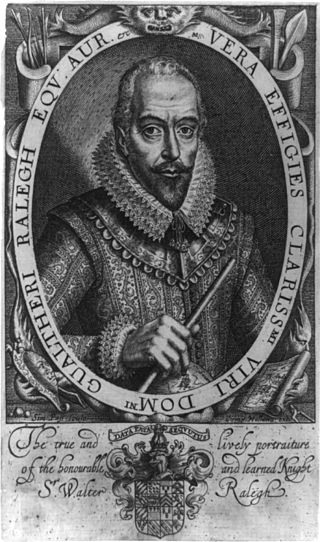
The Lord Warden of the Stannaries used to exercise judicial and military functions in Cornwall, England, UK, and is still the official who, upon the commission of the monarch or Duke of Cornwall for the time being, has the function of calling a stannary parliament of tinners. The last such parliament sat in 1753.

Boconnoc is a civil parish in Cornwall, England, United Kingdom, approximately four miles (6 km) east of the town of Lostwithiel. According to the 2011 census the parish had a population of 96.
Sir Richard Reynell, of Pitney in the county of Somerset, Sheriff of Devon in 1191-4, was a knight who lived during the successive reigns of Kings Henry II (1154-1189), Richard I (1189-1199) and John (1199-1216).

Sir Maurice Russell, JP of Kingston Russell, Dorset and Dyrham, Glos. was an English gentleman and knight. He was a prominent member of the Gloucestershire gentry. He was the third but eldest surviving son and heir of Sir Ralph Russell (1319–1375) and his wife Alice. He was knighted between June and December 1385 and served twice as Knight of the Shire for Gloucestershire in 1402 and 1404. He held the post of Sheriff of Gloucestershire four times, and was Coroner and Justice of the Peace, Tax Collector and Commissioner of Enquiry. His land holdings were extensive in Gloucestershire, Somerset, Dorset, Berkshire and Buckinghamshire. He was descended from an ancient line which can be traced back to 1210, which ended on the death of his son Thomas, from his second marriage, as a young man without male issue. Most of his estates, despite having been entailed, passed at his death into the families of his two daughters from his first marriage.

Sir Philip Courtenay, of Powderham, Devon was the fifth son of Hugh Courtenay, 10th Earl of Devon (1303–1377). He was the founder of the cadet dynasty known as "Courtenay of Powderham", seated at the manor of Powderham, until then a former Bohun manor of little importance, whilst the line descended from his elder brother, the Earls of Devon of the mediaeval era, continued to be seated at Tiverton Castle and Okehampton.

Sir Hugh I Courtenay, of Haccombe in Devon, was Sheriff of Devon for 1418/19 and was thrice elected knight of the shire for Devon in 1395, 1397 and 1421. He was a grandson of Hugh de Courtenay, 2nd/10th Earl of Devon (1303–1377), was the younger brother of Edward de Courtenay, 3rd/11th Earl of Devon (1357–1419), "The Blind Earl", and was the grandfather of Edward Courtenay, 1st Earl of Devon (d.1509), KG, created Earl of Devon in 1485 by King Henry VII. He was the link between the senior line of the Courtenay Earls of Devon made extinct following the Battle of Tewkesbury in 1471 and the post-Wars of the Roses creation of a new Earldom for his grandson made in 1485 by King Henry VII.

The Manor of Molland was a medieval manor in North Devon, England. It was largely co-terminous with the existing parish of Molland, in which is situated the village of Molland. More accurately it consisted from the earliest times of two separate manors, held from separate overlords, later known as Molland-Bottreaux and Molland-Champson.
Sir Richard Arches, of Eythrope, in the parish of Waddesdon, Buckinghamshire, was MP for Buckinghamshire in 1402. He was knighted before 1401.

John Peryam, of Exeter, Devon, was elected four times as a Member of Parliament, for Barnstaple 1584, Bossiney 1586, Exeter 1589 and 1593. He served as Mayor of Exeter. He was the younger brother of Sir William Peryam (1534-1604) of Little Fulford, near Crediton in Devon, Lord Chief Baron of the Exchequer.

Sir Robert Cary of Cockington, Devon, was twelve times Member of Parliament for Devon, in 1407, 1410, 1411, May 1413, April 1414, Mar. 1416, 1417, 1419, May 1421, 1422, 1425 and 1426. Much of his later life was devoted to regaining the many estates and other landholdings forfeited to the crown following his father's attainder in 1388. He was an esquire in the households of King Richard II (1377–1399) and of the latter's half-brother John Holland, 1st Duke of Exeter.
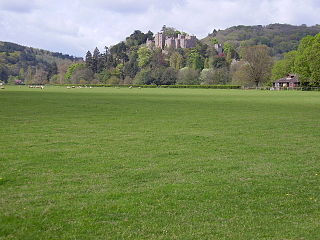
The feudal barony of Dunster was an English feudal barony with its caput at Dunster Castle in Somerset. During the reign of King Henry I (1100–1135) the barony comprised forty knight's fees and was later enlarged. In about 1150 the manors retained in demesne were Dunster, Minehead, Cutcombe, Kilton and Carhampton in Somerset, and Ham in Dorset.
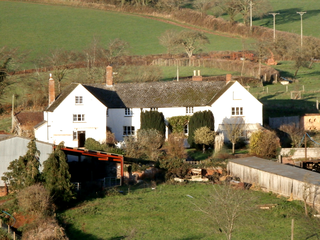
Ruxford is an historic estate in the parish of Sandford, near Crediton in Devon.

West Ogwell is a village and former civil parish and manor, now in the parish of Ogwell, in the Teignbridge district, in the county of Devon, England. It is located 2 miles south-west of the town of Newton Abbot and 1 mile west of the village of East Ogwell. The church and manor house "lie hidden away on their own". In 1891 the parish had a population of 39. In 1894 the parish was abolished and merged with East Ogwell to form "Ogwell".
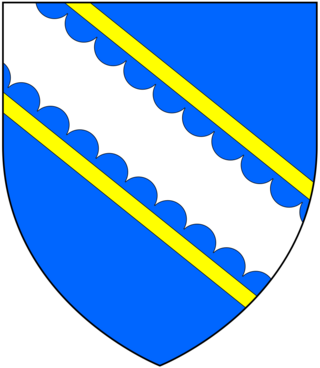
John Fortescue was an English lawyer and administrator from a minor landowning family in Devon.

William Fowell of Fowelscombe in the parish of Ugborough in Devon, was a Member of Parliament for Totnes in Devon in 1455.

Sir John Wadham (c.1344–1412) was a Justice of the Common Pleas from 1389 to 1398, during the reign of King Richard II (1377–1399), selected by the King as an assertion of his right to rule by the advice of men appointed of his own choice, and one of the many Devonians of the period described by Thomas Fuller in his Worthies of England, as seemingly "innated with a genius to study law".
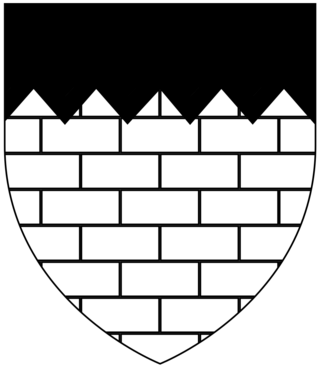
Walter Reynell, of Malston in the parish of Sherford, was an English landowner, administrator and politician from Devon who sat as MP for Totnes in 1447 and as MP for Devon in 1453.

John Reynell was a Member of Parliament for Devon in 1427/28.
Sir Robert Chalons was an English courtier, soldier, administrator and politician from Devon.

The manor of Haccombe was a historic manor in the small parish of Haccombe, near the town of Newton Abbot, Devon, England. It was the seat of important branches of the Courtenay and Carew families.
{{cite book}}: CS1 maint: location missing publisher (link)